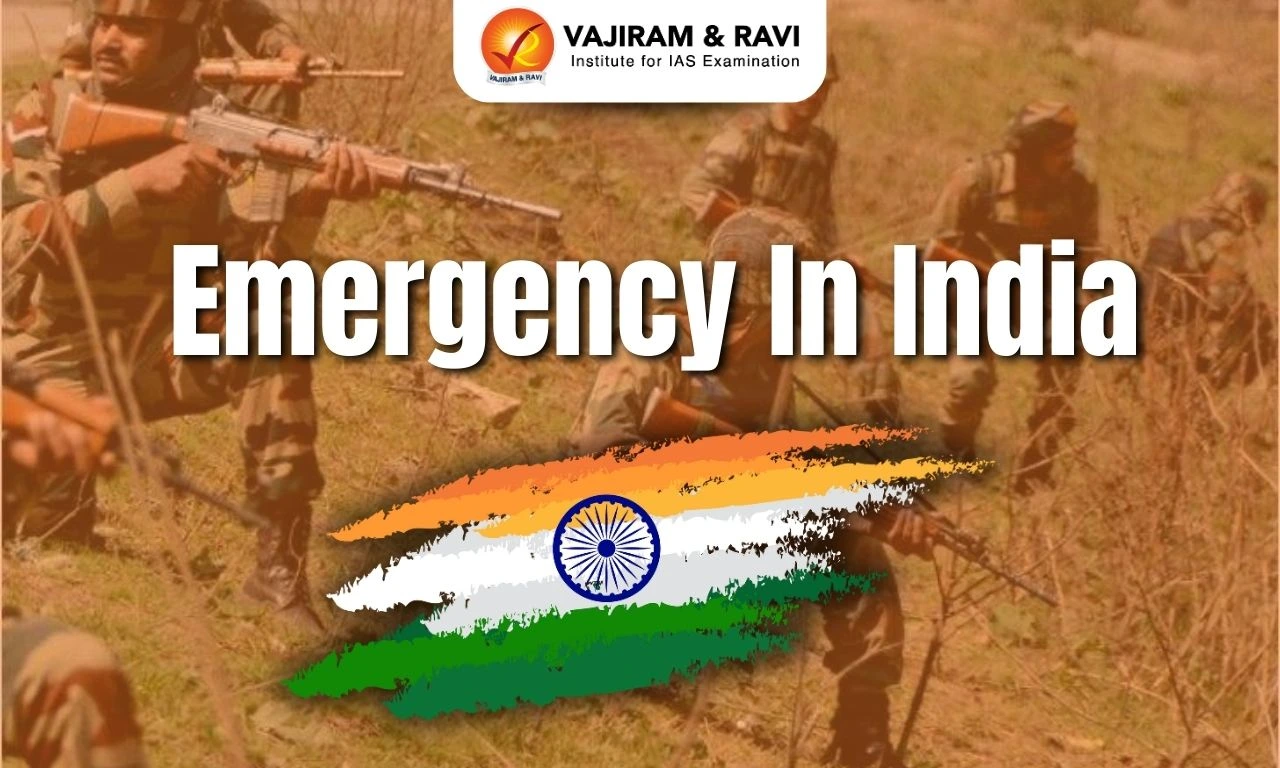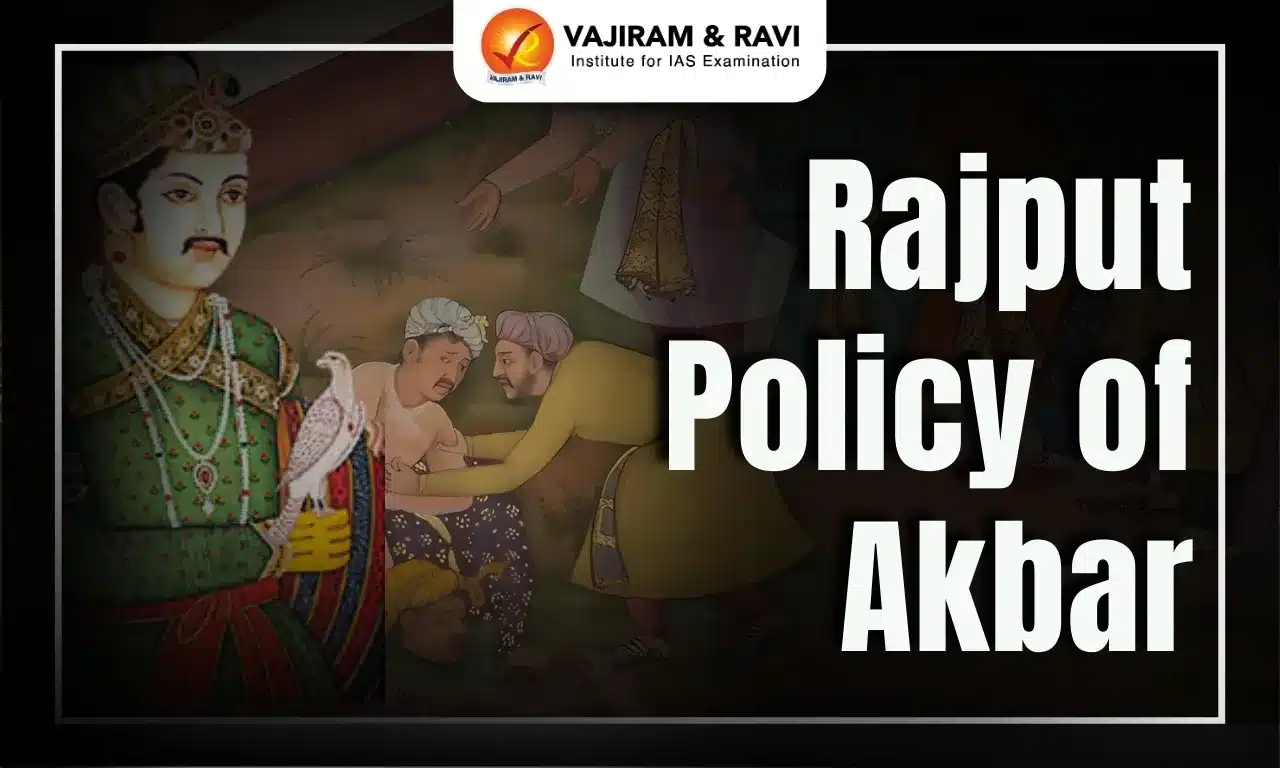What is an Emergency under the Indian constitution?
When an extraordinary situation arises, and that situation cannot be handled with the existing administrative mechanisms, the constitution provides for the imposition of an emergency so that the situation can be handled effectively.
- Constitutional provisions: The emergency provisions are dealt with in Articles 352 to 360 of Part XVIII of the Indian constitution.
- Purpose: The purpose of incorporation is to protect the Constitution, the democratic political system, financial stability and the sovereignty, unity, integrity, and security of the nation.
- Indian constitution provides for the below three kinds of emergencies;
- National Emergency (Articles 352-354, 358-359)
- President’s rule (Articles 355-357)
- Financial Emergency (Article 360)
| Articles | Provisions |
| 352 | Proclamation of National emergency |
| 353 | Effect of the proclamation of National emergency |
| 354 | Application of provisions relating to the distribution of revenues during national emergency |
| 355 | Duty of Union to protect states from external aggression and internal disturbances |
| 356 | Provisions in case of failure of constitutional machinery in states |
| 357 | Exercise of legislative powers under a proclamation issued under article 356 |
| 358 | Suspension of provisions of article 19 during emergencies |
| 359 | Suspension of the enforcement of the rights conferred by part III during emergencies |
| 360 | Provisions as to financial emergency |
What is a National Emergency?
A National emergency can be imposed when the entire nation or a part of it is threatened by an extraordinary situation. A national emergency is classified into two types based on the origin of the threat; internal emergency and external emergency.
Constitutional processes during a National Emergency
- Grounds for proclamation: When war, external aggression (external emergency), or armed rebellion (internal emergency) threatens the security of India or a part of it, the president is authorized by Article 352 to proclaim a national emergency.
- The term “Armed rebellion” replaced “Internal disturbance” by the 44th Constitutional Amendment Act, 1978.
- The President may declare a national emergency, even before the occurrence of the actual threat.
- Parliamentary approval: Within one month after the date of its issuance, it must be ratified by both houses of parliament.
- If the Lok Sabha is not in session or has been dissolved, the proclamation must be approved within 30 days from the first sitting of the newly constituted Lok Sabha.
- Duration of emergency: Normally, the emergency will be in effect for six months after approval.
- However, such a proclamation may be extended indefinitely, with each extension receiving Parliamentary approval by a special majority every six months.
- Revocation: The President may revoke the state of emergency at any time by issuing a new proclamation to that effect.
- Also, if the Lok Sabha adopts a resolution by a simple majority rejecting the continuation of the emergency, the emergency stands revoked.
Impacts of imposition of a National Emergency
The normal political structure is impacted by the declaration of an emergency.
- Effects on the centre-state relations: While a proclamation of Emergency is in force, the normal fabric of centre-state relations undergoes a basic change. this can be studied under three heads:
- Executive: During a national emergency, the centre’s executive authority extends to advising any state on how to exercise its executive authority.
- Legislative: The parliament has the authority to enact laws on any item included in the state list during a national emergency.
- Financial: The president has the authority to scale back or stop the distribution of funds from the central government to the states while a declaration of a national emergency is being considered.
- Impact on the Life of the Lok Sabha and State Assembly: When the national emergency is proclaimed, it will also alter the working of the legislative bodies both at the central and state level.
- Prolonging Lok Sabha: During a National emergency, Lok Sabha’s term may be prolonged beyond its regular term for up to one year at a time, which can be valid for up to six months after the emerg had ended.
- Prolonging state Assembly: Similar to this, during a national emergency, the Parliament may repeatedly extend the normal term of a state Legislative Assembly by one year, up to a maximum of six months after the situation has ended.
- Effect on Fundamental rights: The impact of a National emergency on Fundamental rights is described in articles 358 and 359 of the constitution.
- Suspension of fundamental rights under Article 19: The six fundamental rights under Article 19 are immediately suspended when a proclamation of national emergency is made, under Article 358. Their suspension does not require a separate court order.
- Suspension of other Fundamental rights: According to Article 359, during a national emergency, the president is authorized to suspend the right to petition any court for the enforcement of fundamental rights. In other words, only their enforcement is delayed rather than the fundamental rights themselves.
What is a President’s Rule?
The centre has a responsibility to make sure that each state government operates in accordance with the provisions of the constitution. If the constitutional machinery fails in the state, the centre can assume control of the state. This is famously known as President’s rule.
- Consequences of the President’s rule: The Governor carries on with the administration of the state on behalf of the President.
- He/she takes the help of the state’s Chief Secretary and other advisors/administrators whom he or she can appoint.
- Also, the President has the power to declare that the state legislature’s powers would be exercised by the Parliament.
Constitutional processes during a President’s Rule
- Grounds of imposition: Under Article 356, the president may be declared the ruler for the following two reasons:
- If the President is satisfied that a situation has arisen in which the government of a state cannot be carried out in conformity with the provisions of the constitution, he/she is authorized by Article 356 to issue a proclamation.
- According to Article 365, the President may declare that a situation has arisen in which the state’s administration cannot be carried out in accordance with the provisions of the constitution or whenever a state refuses to comply with any directive given by the centre.
- Parliamentary approval and duration: Parliamentary approval is necessary to impose President’s rule on any state. The proclamation of the President’s rule should be approved in both Houses of Parliament within two months. The approval is through a simple majority.
What is a Financial Emergency?
Article 360 empowers the President to proclaim a financial emergency if he/she is satisfied that a situation has arisen due to which the financial stability or credit of India or any part of its territory is threatened.
Constitutional processes during a Financial Emergency
- Approval: Within two months, the Parliament must pass a resolution approving the financial emergency with a simple majority.
- Duration: The financial emergency lasts indefinitely after being approved by the parliament until it is cancelled. This means that there is no fixed maximum term for its operation and that parliamentary permission is not required repeatedly for it to continue.
- Withdrawal: By issuing another proclamation to that effect, the president may declare the emergency to be over. A revocation of this nature does not need parliamentary approval.
Effects of a Financial Emergency
- Expansion of the Union’s executive power over the States’ financial affairs.
- Reduction in the pay and benefits received by all or certain classes of state employees.
- After being approved by the state legislature, all money bills and other financial bills are reserved for the President’s approval.
- The Supreme Court and High Court judges, as well as any other class of employees who serve the Union, are to have their salaries and benefits reduced, according to a directive from the President.
Last updated on April, 2025
→ UPSC Notification 2025 was released on 22nd January 2025.
→ The UPSC Vacancy 2025 were released 1129, out of which 979 were for UPSC CSE and remaining 150 are for UPSC IFoS.
→ As per UPSC Notification, the last date to apply is 18th February 2025.
→ The UPSC Prelims 2025 is scheduled to be conducted on 25th May 2025 and UPSC Mains 2025 will be conducted on 22nd August 2025.
→ Apply once through it and aspirants can apply for various government exams conducted by UPSC.
→ The UPSC Selection Process is of 3 stages-Prelims, Mains and Interview.
→ UPSC Result 2024 is released with latest UPSC Marksheet 2024. Check Now!
→ UPSC Toppers List 2024 is released now. Shakti Dubey is UPSC AIR 1 2024 Topper.
→ Also check Best IAS Coaching in Delhi
Emergency in India FAQs
Q1. Where are the emergency provisions under the Indian Constitution borrowed from? +
Q2. Which Indian states have not been subject to President’s rule so far?+
Tags: emergency in india quest















